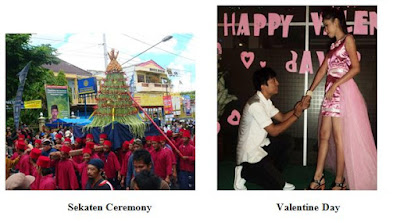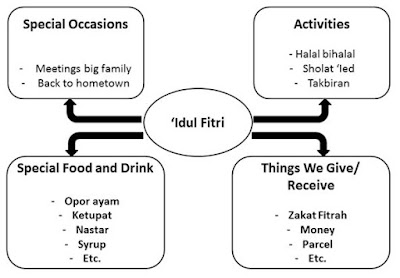Paper Let's Celebrate Bahasa Inggris I BSI
LET’S CELEBRATE
Lecturer
: Palupi, S.S, M.Pd.
Compiled
By :
Class
12.1A.21
1. Fatimah
Isnaeni (12145191)
2. Elfiatun
Nurul Hidayah (12145199)
3. Anis
Murniati (12145203)
4. Fanny
Fatmawati (12145216)
5. Riyan
Latifahul Hasanah (12145229)
6. Fahrum
Nisa Asih (12145257)
Manajemen
Informatika
Bina
Sarana Informatika Purwokerto
2014
DO YOU CELEBRATE THESE OR SIMILAR HOLIDAYS IN YOUR COUNTRY?
MAP WORD
GRAMMAR FOCUS
Relative Clause of Time
We use relative
clauses to give extra information about something. We can get more information
into a sentence without the need to start a new one.
Relative
clause “WHEN” is used with time
nouns.
EXAMPLES :
·
Thanks
giving is a day
when
North Americans
celebrate the harvest.
·
February
14 is the day when people give cards to the ones they love.
·
New
year’s Eve is a night when I have fun with my friends.
Complete
the sentences in column A with information from column B.
ENGLISH CONVERSATIONS AT THE BIRTHDAY PARTY
Father : Happy birthday my sweet Tukiyem!
Tukiyem : Thank you very much Dad.
Father : I am going to celebrate my daughter's birthday in a grand manner.
Tukiyem : Oh! I see.
Mother : Well. Happy birthday Tukiyem.
Tukiyem : Thank you Mom.
Uncle : Many more happy returns of the day.
Tukiyem : Thank you Uncle and thank you for coming.
Uncle : Where is your brother?
Tukiyem : He is looking for his camera.
Uncle : Then he is going to cover the party. Isn’t it?
Tukiyem : Yes. He likes taking photo.
Brother : Many more happy returns of the day.
Tukiyem : Thank you my sweet brother.
Uncle : Here is my gift.
Tukiyem : Thank you very much Dad.
Father : I am going to celebrate my daughter's birthday in a grand manner.
Tukiyem : Oh! I see.
Mother : Well. Happy birthday Tukiyem.
Tukiyem : Thank you Mom.
Uncle : Many more happy returns of the day.
Tukiyem : Thank you Uncle and thank you for coming.
Uncle : Where is your brother?
Tukiyem : He is looking for his camera.
Uncle : Then he is going to cover the party. Isn’t it?
Tukiyem : Yes. He likes taking photo.
Brother : Many more happy returns of the day.
Tukiyem : Thank you my sweet brother.
Uncle : Here is my gift.
Tukiyem : What a lovely
present!
Brother : Here is my present.
Tukiyem : Oh! How nice it is!
Father : It is my gift.
Tukiyem : Oh! What a splendid gift!
Mother : I am going to present you a kimono.
Tukiyem : A kimono? But I don't know to wear.
Mother : Let me teach.
Tukiyem : Thank you.
Father : Ok Tukiyem cut the cake.
(Tukiyem cuts the cake.)
(All are singing happy birthday to Tukiyem.)
Uncle : Let's all enjoy ourselves.
Tukiyem : That's what a celebration is for!
Brother : Here is my present.
Tukiyem : Oh! How nice it is!
Father : It is my gift.
Tukiyem : Oh! What a splendid gift!
Mother : I am going to present you a kimono.
Tukiyem : A kimono? But I don't know to wear.
Mother : Let me teach.
Tukiyem : Thank you.
Father : Ok Tukiyem cut the cake.
(Tukiyem cuts the cake.)
(All are singing happy birthday to Tukiyem.)
Uncle : Let's all enjoy ourselves.
Tukiyem : That's what a celebration is for!
GRAMMAR FOCUS
Adverbial Clauses of Time
An adverb clause of time shows when something
happens. It is usually introduced by time adverbs. Examples are : before,
after, as, when, while, until, as soon as, since, no sooner than, etc.
Note that all adverb clauses are subordinate
clauses. The cannot stand on their own and must be attacted to an
independent clause.
EXAMPLES :
·
I always take a bath before I go to
bed
·
Will you wait here until I am ready?
·
I was not at home when he came to see
me
·
Do not distrube me when I am busy
with my work
·
As soon as she finished that
project, she starded working on the next
·
After I have finished my work,
I will accompany you to the park
NOTES :
An adverb clause of time can come before or after
the main clause. When it comes before the main clause, we usually separate it
with a comma (,). Commas are not a necessary when the adverb clause goes after
the main clause.
EXAMPLES :
·
Whenever I think of her,
my eyes get misty
·
My eyes get misty whenever I think of
her
TENSE :
If you are talking about something that is yet to happen
in the future, use a present tense in the adverb clause and a future
tense in the main clause.
EXAMPLES :
·
I will start when I am ready.
(NOT I will start when I will be ready)
·
I will not go until I get my money
back. (NOT I will not go until I will get my money back)
MATCH THESE PHRASES WITH THE
INFORMATION BELOW
= = = = = = = = = = = = = = = = = = = = = = = = =
Baca juga materi Semester 1 UBSI lainnya:









Komentar
Posting Komentar